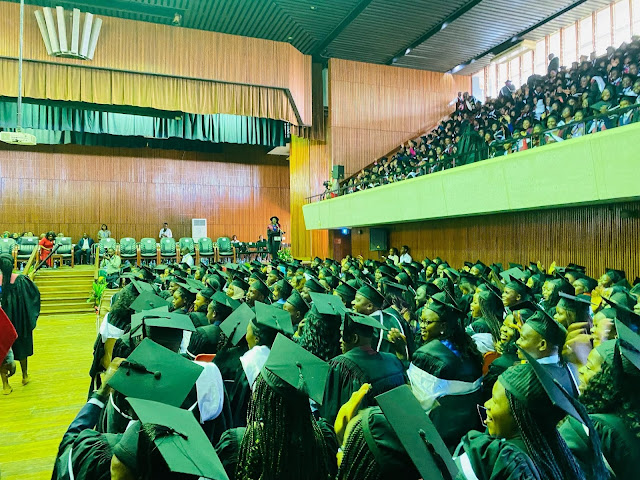Who is a Malawian Public University graduate?
 |
| UNIMA graduation, April 2025 (Credits: UNIMA Facebook Page) |
Have you
ever walked in the corridors of the University of Malawi (UNIMA) or any other
public university as a student?
As we walk
the corridors of Malawi's public universities, we are reminded of the
resilience and determination of students who strive for excellence despite
numerous challenges. From limited resources to financial constraints, these
students persevere to fulfil their dreams of a brighter future.
After
successfully being enrolled in various public universities for undergraduate
studies, either as generic or mature students, many face hardships. Once
enrolled, it is common for people back home to heap praises and focus on the
belief that the student will come back home with "the paper" in the
later years. Unlike in religion where faith is supreme, university students
need extra necessities to help them run their day-to-day activities. These
necessities are not limited to cooking flour, rice, groceries, and money for lunch
and supper, especially for those residing in the school’s hostels.
Many
students struggle to make ends meet at these institutions due to financial
limitations, and again, psychological constraints caused by academic pressure.
Some students complain of being redirected to programs they never wished to
study. Others lament about academicians who appear inconsiderate to their
academic needs, but that is a story for another day. There have even been
tragic trends where universities, particularly the University of Malawi, have
lost aspiring graduates to suicide. Almost every academic year since 2022,
students have forced themselves into the silent palace. It is the struggles
they face at the institution that prompt them to seek an escape route from the
difficulties.
The Malawi
government tries to support generic students by subsidising education costs and
providing loans. Despite this financial help, many generic students still struggle
to access basic needs which prompt some to withdraw or seek public assistance
through social media. Those who are bold enough open up, and help is given by
friends and philanthropists. The problem arises when students fail to speak up
about their struggles, whether financial or academic which lead to a silent
suffering. The end result is often either suicide or reckless engagement in
drugs and substances, especially marijuana and alcohol.
It even
gets harder for those who enrolled as mature students; they are not given any
financial support from the government—no loans and subsidies. Unless they are
employed by institutions willing to sponsor their education, they must shoulder
everything themselves. Mature students are expected to worry less, at least in
the eyes of generic students who assume that their peers are financially sound
due to their admission requirements: proof of work experience, financial
statements, or sponsorship letters. Some generic students even ask for
financial help from these mature students for luxuries, not knowing that even
mature students are unsure of how they will source their own funds. The
emotional burden placed on the experienced student, and the silent power that
financial expectations hold over them, separates them from their younger
counterparts. Some leave behind families that rely on them financially. When
they compare their earnings to tuition fees and other necessities, it is a
nightmare. Still, they soldier on, and face battles brought upon by
academicians in their quest to be certified for the academic award.
 |
| Some UNIMA BACCS class of 2024 graduates (Credits: Dr. Chavinda) |
To graduate
from these institutions, resilience is essential, and most importantly God's grace for
many. Despite atheism claims, many cry for help in the name of love. As one big
family per UNIMA, arms are stretched to pull each other out of messes:
financial, academic or psychological. A degree is a testimony that one attended
university, but the real lessons gained from these institutions are not
recorded on the transcripts. Those transcripts are strictly information of
courses attended in a classroom or an academic required research. The most
important lessons from university are stored in the graduate’s brain, the true
centre of the degree.
Some argue
that a degree is just a paper, but they never understand the struggles and
efforts invested to earn it. The lessons learned are the reason people boast
about having studied at a public university, not just for academic achievement but
for the life lessons gained from interacting with people of different
backgrounds in the country, and sometimes from across the globe. A degree is
not just a paper, it is a testimony of resilience, hope and determination.
 |
| A sigh of relief as student is ready to be conferred his Bachelors in 2025 (Credits: UNIMA Facebook page) |
Behind
every graduation photo is a story of survival. A story of skipped meals, silent
cries, sleepless nights, postponed dreams and quiet courage. The mortarboard is
not just worn on the head, it rests on the weight of everything a student had
to endure to earn it.
 |
| Last Man standing (Credits: UNIMA Facebook page) |
They are not just graduates. They are survivors, the last kind standing with a mortarboard.
A question for your mind, who is a graduate from a public university in Malawi?
Indeed, a graduate from a public university not only gains knowledge in their field, but also learns a lot about resilience, perseverance, and developing coping mechanisms for the realities of life.
ReplyDelete